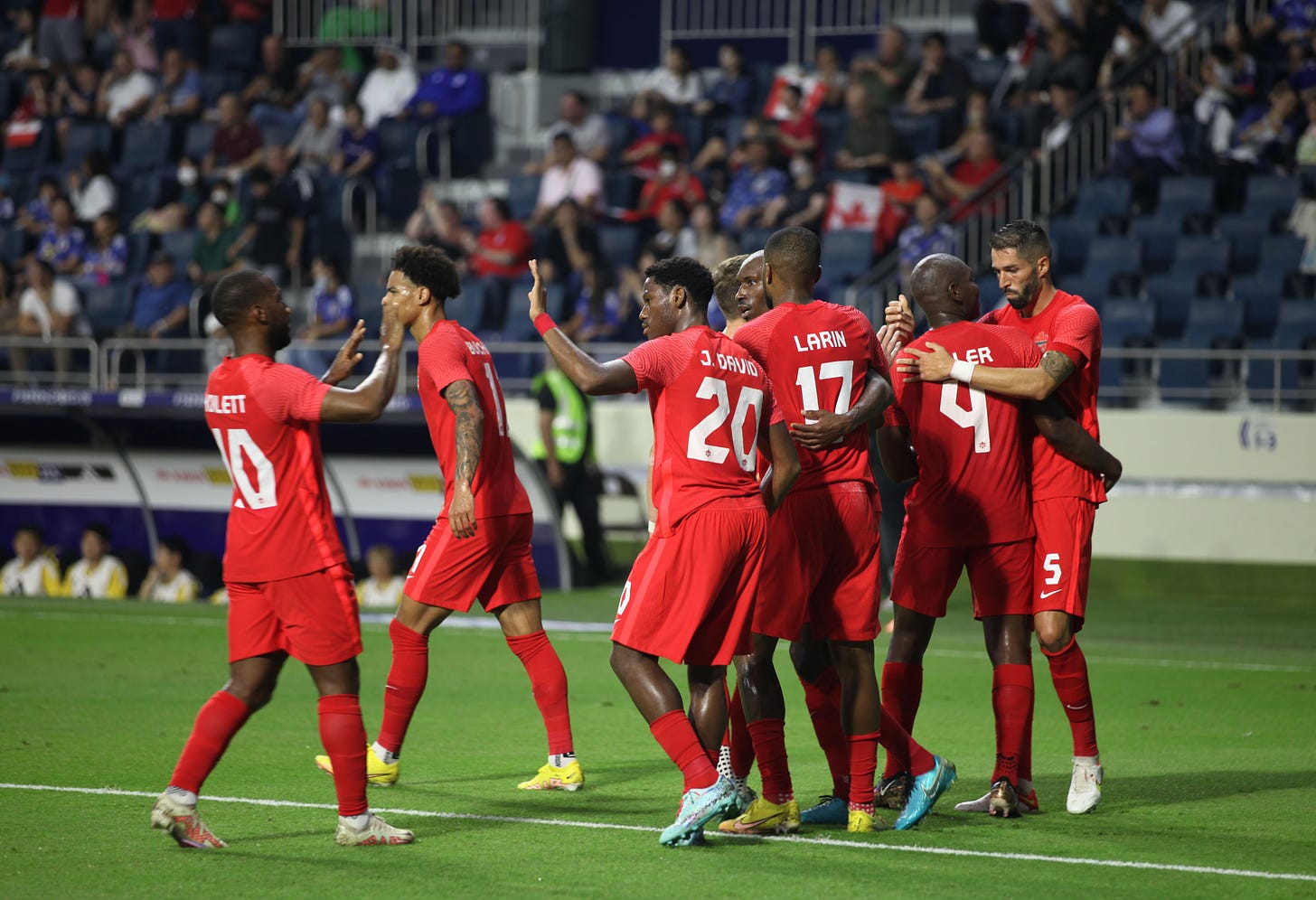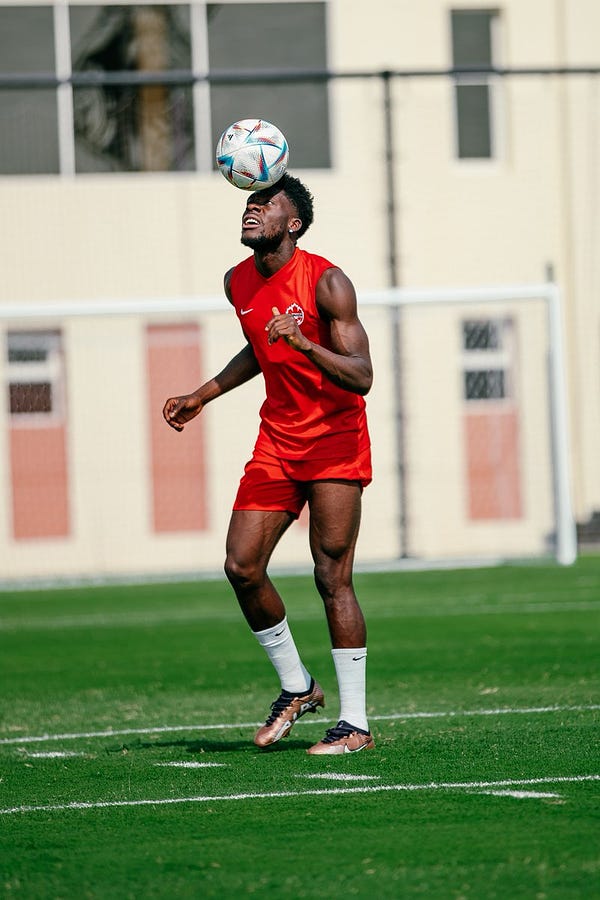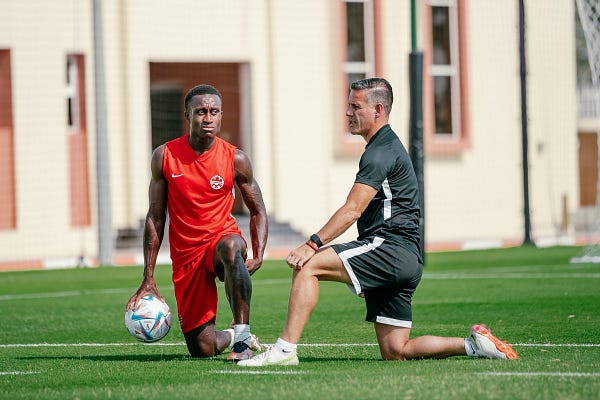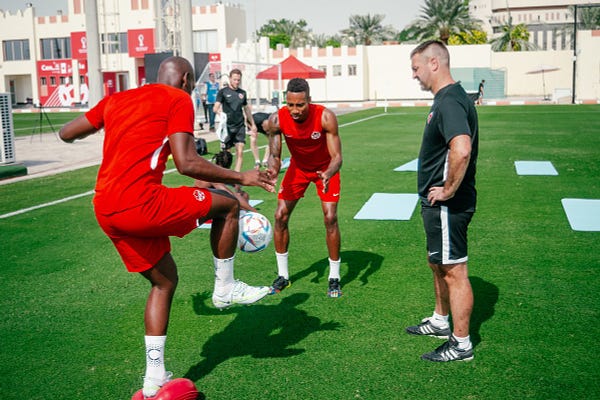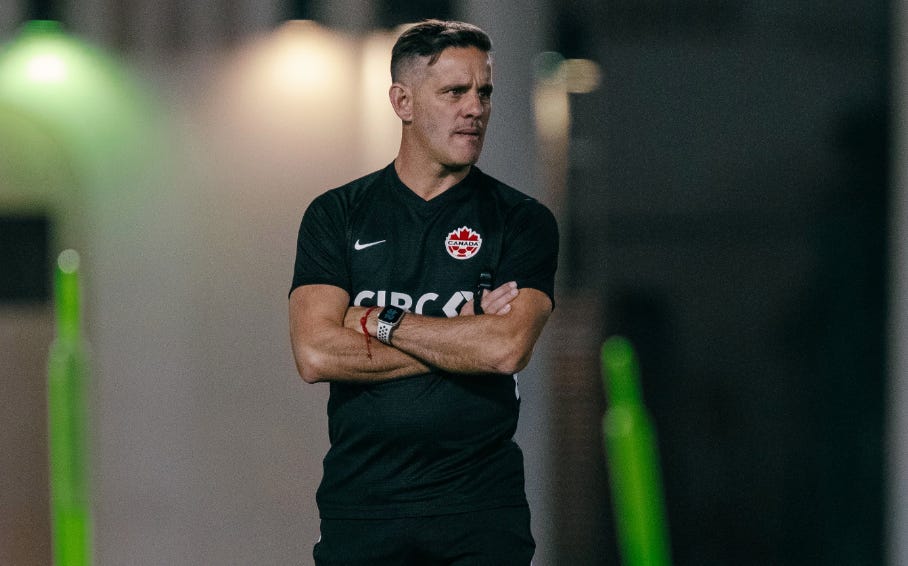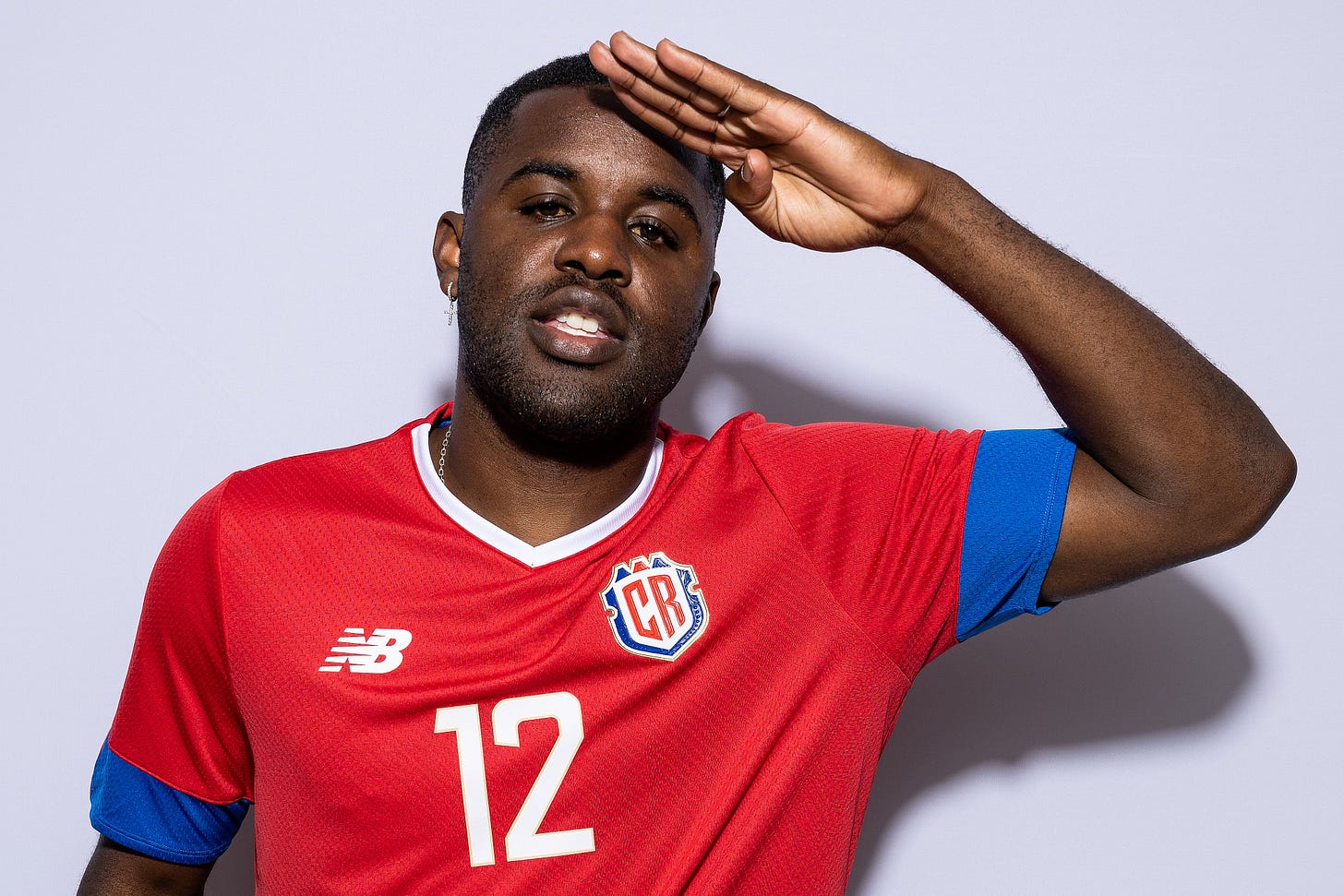Concacaf World Cup megapreview (Experts' version) Part 2: Canada, Costa Rica
We sip on that syrup & spitball on La Sele
My outsourcing of previews of Concacaf teams (really, me assuming you’ve heard enough out of me before a ball actually starts rolling) continues, with three experts giving their perspective on Canada and a pair of cracks giving us the Costa Rica scoop.
Missed the USA and Mexico previews? Click here - and get subscribed so you don’t miss any other newsletters:
Canada
The experts:
Rudi Schuller and I used to be co-workers over at Goal and spent many a day chatting about obscure Canada prospects on Skype during shifts. He’s now with DAZN. Once, he smoked me at bubble hockey.
Peter Galindo freelances with Sportsnet, MLS and other spots, plus helps host the Northern Futbol podcast.
Alexandre Gangué-Ruzic used to slum it as a newsletter writer like me but now publishes his Canada analysis plus CanPL write-ups on OneSoccer.
JA: How are you feeling and how is the nation feeling? Help us understand what the buzz is for this World Cup, the first Men’s World Cup for Canada in many of our lifetimes.
PG: The country’s anticipation is building. It seems like the closer we get to the World Cup, the more excited everyone is to watch Canada. The squad announcement last Sunday seemed to be the event that made everyone realize, “Wow, this is actually happening!”
For me personally, I’m thrilled that I’ll be covering the World Cup on location to see Canada (plus other countries), having covered the program for seven years along with nearly 20 years following the team,
RS: The buzz is building, for sure.
Like most other countries, the timing of the World Cup has buried the lead-up behind a lot of other things that normally wouldn't be top of mind in the weeks heading into the tournament, but once the calendar changed over to November some obvious signs of the competition's impending start began to appear (bus shelter advertisements, social media posts from non-soccer media, jersey displays in sports apparel stores, etc.). That's been building up, and grows with each passing day.
As for me personally, I'm still taking it all in. As someone who fell in love with the game by following the national team and local club teams in my youth, the fact that Canada will be kicking off in a men's World Cup in a matter of days is both surreal and yet it also feels like it's been a long time coming.
AGR: It’s huge to see Canada reach this stage, given that it has been so long since they’d last done so. For myself and many others, this is the first time seeing Canada at this tournament, so it almost feels surreal that we’re now days away from seeing Canada share the field with the likes of Belgium, Croatia and Morocco.
Given its strong immigrant population and immense diversity, Canada is always a country that loves the World Cup, and will always follow along feverishly, but usually, that excitement is reserved for other teams. To now see many people put that energy behind Canada, however, is going to be special.
JA: Between Davies’ knock, Henry missing the tournament and the gross Crepeau injury, it seems the injury bug is biting at the wrong time. How concerned are you about a lack of depth?
RS: It's been an obvious point of concern for anybody watching the team that the lack of depth in the back is Canada's weakness, and has been since the days of Jason de Vos, Paul Stalteri and Kevin McKenna marshalling the back line.
So of course, all the injuries are to defensive players, barring Alphonso Davies who is an attacker while on national duty. Doneil Henry and Scott Kennedy's absences have created a huge hole in the central defense, with once-capped Joel Waterman stepping in after a shaky Canada debut and, likely, Atiba Hutchinson and Liam Fraser looking to provide cover if needed.
That the latter two are central midfielders, one of whom is 39 years old, should tell you just how dire the situation is in that part of the field.
Maxime Crepeau's injury, while devastating, was in a position of relative strength for Canada given Milan Borjan's stranglehold on the job and Dayne St. Clair's emergence, although St. Clair has yet to play a national team match of real intensity.

AGR: Injuries have dogged Canada for most of 2022, so this is nothing new, but it certainly hurts to see some key faces either battling the injuries or being ruled out of the tournament entirely.
As Canada showed during qualifying, they’re a team that is more than the sum of their parts, as they won several key games even when missing key regulars like Alphonso Davies, Stephen Eustáquio, Atiba Hutchinson, Cyle Larin and Milan Borjan, but it still hurts to lose anyone important now given the step up in level that they’re about to take.
So overall, Canada’s depth is in a good enough spot where they have players that can step up, if needed, they’ll have their fingers crossed that their best players stay healthy, as they’ll be crucial if Canada is going to have any chance at thriving, instead of just surviving and barely hanging on.
PG: Thankfully, Davies should be fully fit for Belgium so there aren’t any concerns there. (JA’s note: We had this chat a week ago…we’ll see)
Midfield is the real concern for me.
The fact Herdman has called up eight midfielders indicates that he feels the same way. Mark-Anthony Kaye hasn’t been himself for months, Jonathan Osorio looked good against Bahrain but that was just one 90-minute match. Plus, Atiba Hutchinson only has 70 minutes in his legs this season as of right now. Considering the strength of the midfields from their Group F opponents, that has to be a worry.
JA: Speaking of Henry being out, Scott Kennedy also is out. What’s Canada’s defense going to look like and will it be good enough to stop European teams?
AGR: Canada’s defense will consist of Steven Vitória, Kamal Miller, Alistair Johnston and Samuel Adekugbe, who will form a back four off the ball, before shifting into a back five on it.
This is the core group that mostly started when Canada had everyone healthy, and will likely play heavy minutes in Qatar. Otherwise, Richie Laryea could also slot in at either full back, and could even make it a back five if Canada feels the need to be more defensive.
Beyond them, however, there are a lot of players who haven’t played much for Canada, making the absences of Doneil Henry and Scott Kennedy painful. They might not have played much at this World Cup, but they could’ve certainly stepped up if needed, as now, any injuries will either some relatively untested options such as Derek Cornelius or Joel Waterman step in, or someone like Atiba Hutchinson step back into centre back.
Individually, their defense might struggle against top opposition, although they do defend very well as a unit, as they showed throughout their qualifiers. Because of that, any success that Canada will have defensively will come from strong defensive cohesion and organization, instead of 1v1 dominance. Maintaining that will be the difference between them getting blown out, or giving themselves a chance to grab results through their electric offense.
PG: The back line is thinner than usual but it was likely that Herdman was going to lean on Alistair Johnston, Steven Vitoria, Kamal Miller and Sam Adekugbe as much as possible anyways. Obviously suspension or injury (touch wood!) will test that.
Whether or not that’ll suffice against the big boys rests on the midfield, to be honest. Canada isn’t blessed with tremendous pace but when the team is defensively disciplined, specifically in the central channels in counter-attacking situations, then it’s not a massive issue. As we saw against Uruguay, though, if Canada is disorganized or lackadaisical off the ball, then they’ll be punished.
RS: It's going to be thin, as mentioned. Steven Vitoria, at 35 years old, is the only one on the squad that can play in the middle of a back three, which John Herdman likes to employ. Waterman can do it, but struggled mightily against Bahrain last week and he won't have Rudy Camacho to lean on like he does in Montreal.
That being said, the true strength of Canada's overall defending is its ability to do so all over the field, including from the front where Davies, Jonathan David and Tajon Buchanan will all hound opposing defenders to try to force turnovers in the final third.
That part of the game will still be intact so the game plan may be to try to prevent the back line from being put under pressure by defending in other areas of the pitch.
JA: What is success at this tournament? If Canada repeats the 1986 tournament and comes home with no points, is it a failure? What’s the proper reaction?
RS: John Herdman has been telling anyone that will listen that success at this tournament comes in many different forms. The 1986 team was shut out and didn't pick up a point, so the first goal, first point and first clean sheet are all objectives that, if reached, will be considered successes in their own right. That being said, I don't think this team is built to accept moral victories, and they'll be looking to get actual victories instead.
Whether that happens remains to be seen, but it would absolutely be a failure if Canada repeats 1986 and comes home with no points. What the proper reaction to that would be would depend on how the games played out. If they're all hard-fought one-goal losses, the reaction would need to be different than if they got blown out three matches in a row.
AGR: It’s all about reaching new frontiers for Canada. Ultimately, people aren’t expecting them to top the group, but there’s no reason why this team can’t compete in each game, even if they lose each match. Especially given the talent that they have, they can also cause problems in a lot of phases of the match for opponents when they do what they do best.
Therefore, while the goals for Canada will be to tick off some firsts, such as first goal, first win and maybe even a first qualification to the knockout stage, they’ll chase those ideals knowing that at the very least, they’re going to compete and frustrate their opponents in each and every game that they play.
RS: If Canada looks like it belongs, regardless of the score lines, then the plan wouldn't need much changing going forward. If they are the worst team in the tournament by a big margin, then obviously changes would need to occur.
PG: Realistically, Canada can be a plucky third-place side, similar to what Iran accomplished in 2018 with Spain and Portugal in their group. They took a point off Portugal, beat Morocco and nearly beat Spain to reach the knockout stage.
I feel like if Canada can reach that bar (and score their first men’s World Cup goal), they’ll satisfy many people.
Costa Rica
The experts:
Eddie Mendez: The man you know as CRCFutbol, Eddie goes deeper on Costa Rican soccer than basically anybody else abroad or in Costa Rica. A frequent guest of the post-WCQ Twitter space, we once tried to shake hands before a Costa Rica qualifier but were thwarted by the chaos around the Estadio Nacional.
Estefan Monge works at Deportes Repretel and Radio Monumental, often securing interviews with top figures in Costa Rican soccer. He once tried to get me onto a morning show live from the Costa Rican federation HQ, which I declined when he told me just how early you have to show up to do a morning show.
This is unprecedented. Our experts have the same initials, so I’m calling Eddie CRCFutbol and Estefan…Estefan
JA: Look, let’s just get this out of the way. The draw is really tough. Costa Rica needed the playoff to qualify. But if you’re drawing out a path to another run like 2014 what does it look like?
Estefan: I think Costa Rica has what it needs to qualify again because as the qualification cycle advanced, the team found the synergy to advance. There was more unity, better rapport. Luis Fernando Suarez knew how to find the best XI and the playoff helped spark inspiration, raise the spirit and get to the Middle East once again with the motivation to do a good job.
CRCFutbol: It starts with a positive result over Spain. That's a non-negotiable. Costa Rica will only be able to maneuver itself out of this group with a point, ideally three, against Spain. Building off that, you hope Japan's average age (27.8) rears its ugly head in the second match. We're not far behind (27.2), but that's because Bryan Ruiz is planning his retirement next month and made our roster.
I fear Japan's style of play against ours because I fear Luis Fernando Suarez will rely on an older midfield that can be cut through like swiss cheese. We have the young studs to punish Japan: Jewison Bennette (18), Brandon Aguilera (19), Anthony Contreras (22), Carlos Martinez (23), etc. If Suarez chooses that route, you have a puncher's chance. Then you pray four points is enough because Germany handled its own business and comes into our match with six points.
That's the ideal path out of a difficult group stage. After that, you're in the knockouts. Anything goes when you have Keylor Navas.
JA: Who’s the most important player after Keylor Navas?
CRCFutbol: Joel Campbell.
In World Cup qualifying, the two were neck-and-neck for the best grade, according to my analysis (which is awesome, proprietary, and a proven method for pinpoint talent projection).
Navas finished ahead with a 4.62 grade (out of 5), but only because he had three perfect grades in his last five matches and a 4.8 against New Zealand. Campbell finished with a 4.28 and solidified himself as the clear-cut engine of this team. He positively impacted our attack an average of 21.58 times per match, by far the most of any player. The attack goes as he goes. His game matured in WCQ. He's as versatile as ever, allowing Suarez to deploy him as needed with every tactical adjustment.
Estefan: After Keylor Navas, the legacy Bryan Ruiz has left stands out, who is now in his last weeks before retiring.
Celso Borges is another of Costa Rica’s most decorated players and after them you have three players called “The Three Musketeers” in Costa Rica in Francisco Calvo, Yeltsin Tejeda and Joel Campbell. From different levels, they showed that they’re the successors to lead the Costa Rica national team.
JA: I know you’ve got some frustrations with the selections Luis Fernando Suarez has made. What is your biggest one and your ‘worst omission’ and why?
CRCFutbol: You can start at the beginning of WCQ.
Suarez made Manfred Ugalde quit the national team because he set him up to fail and then threw him under the bus instead of taking ownership of his shortcomings; however, the biggest, and most unforgivable omission, is Cristian Gamboa. Keysher Fuller making a World Cup roster is a fireable offense.
Leaving home a clear-cut starter for Costa Rica and a first-division club (VfL Bochum) in Germany is inexcusable, especially when you will need to rely on your defense to keep the potent attacks in our group at bay.
That's two starters you left home because of your difficult personality.
Estefan: Despite his great legacy and his experience, or his role as a leader, I’ve got my doubts about the level Bryan Ruiz takes into the World Cup. It’s tough to see him playing 90 minutes.
The Johan Venegas call also has been a question, with his selection something the Costa Rica fans don’t like, but we’re hoping he can improve at the World Cup.
CRCFutbol: The list can go on. Randall Leal, Alonso Martinez, Jimmy Marin, all these guys deserved consideration, but no. Let's make sure we take Johan Venegas.
JA: The new generation seems to be there with a number of ‘new names’ joining either late in 2021 or in early 2022. Did the process need to start sooner? Is the future bright for Costa Rica even if it can’t get out of a brutal group this time around?
CRCFutbol: The process started with Gustavo Matosas, but that went sideways quickly. It was further derailed when Ronald Gonzalez took over because he couldn't pick a squad to save his life. It shouldn't have taken six WCQ games for everyone to figure out that maybe calling up a 39-year-old Alvaro Saborio and a 37-year-old Christian Bolaños isn't the best idea. This team would be in overall better shape if the process started before the 2021 Gold Cup.
Despite all that, I'm still bullish on the future of this group. It was a U20-23 team that beat the U.S. in the last match of WCQ. Despite its coach's questionable tactics, this team has proven it can get results. With players like Jewison Bennette and Brandon Aguilera already in England, Daniel Chacon moving to MLS, and Anthony Contreras next on that list, our young profile will continue to increase. Four or five more U23 players will make a splash in the transfer window in the next 18 months.
Estefan: Luis Fernando Suarez hasn’t been afraid to give young players their debuts, and they’ve responded really well, for example: Brandon Aguilera, Jewison Bennette, Anthony Contreras, Álvaro Zamora, Anthony Hernández y Roan Wilson.
It’s a generational change that needed to be made a while ago, but the change in managers and the way Costa Rica was playing meant they couldn’t do it. However, Suarez is a manager with “a good eye” and knows how to pick the right ones.
CRCFutbol: I'm bullish on the 2026 project if we find better leadership.
JA: If there’s a breakout star in this tournament, who’s it going to be?
CRCFutbol: The easy names are Jewison Bennette and Anthony Contreras.
The two will have great platforms to display their talents, but I'm hoping it's Juan Pablo Vargas for two reasons: He's been the best player in Colombia for a year now and is incredibly overlooked because of the league he plays in. He is our most talented center back entering the World Cup.
If Costa Rica can survive embarrassment at this World Cup, it will be because of our defense. Vargas will need to be at the forefront of that. You will not be able to avoid crucial, individual errors relying on Oscar Duarte and Francisco Calvo for three matches.
Granted, Vargas is 27. He's no spring chicken, but he is a full-grown man. I can see many European clubs fall in love with his size, stature, and the fact that he's a lefty. Directors will view him as a plug-and-play solution for many clubs vying for defensive stability.






